
The insects of the beetle family Chrysomelidae are commonly known as leaf beetles, and include over 37,000 species in more than 2,500 genera, making up one of the largest and most commonly encountered of all beetle families. Numerous subfamilies are recognized, but the precise taxonomy and systematics are likely to change with ongoing research.
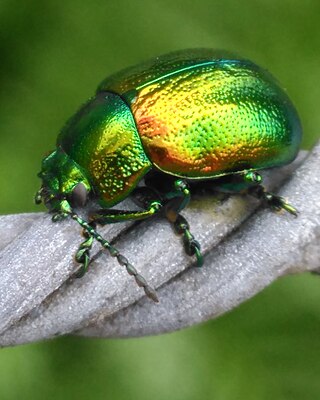
The tansy beetle is a species of leaf beetle. The common name derives from its main foodplant, Tansy, but it can also use other wetland plants such as Gypsywort and Water Mint. It measures 7.7–10.5 mm in length and has a characteristic bright metallic green colouration, with pitted elytra and a coppery tinge. In addition to the nominotypical subspecies, which repeats the specific name, C. graminis graminis, there are five further distinct subspecies of Tansy beetle, which, collectively, have a Palearctic distribution, although in the majority of countries where it is found the species is declining. In the United Kingdom it is designated as 'Nationally Rare'. The stronghold population here is located along the banks of the river Ouse in York, North Yorkshire. Other, small, fenland populations exist at Woodwalton Fen and at Welney Wildfowl and Wetlands Trust (WWT) reserve.

The mustard plant is any one of several plant species in the genera Brassica, Rhamphospermum and Sinapis in the family Brassicaceae. Mustard seed is used as a spice. Grinding and mixing the seeds with water, vinegar, or other liquids creates the yellow condiment known as prepared mustard. The seeds can also be pressed to make mustard oil, and the edible leaves can be eaten as mustard greens. Many vegetables are cultivated varieties of mustard plants; domestication may have begun 6,000 years ago.

Chrysolina cerealis, the rainbow leaf beetle or Snowdon beetle, is a beetle belonging to the family Chrysomelidae.
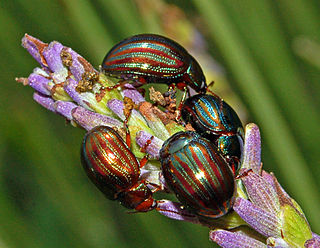
Chrysolina americana, common name rosemary beetle, is a species of beetle belonging to the family Chrysomelidae.

Chrysolina is a large genus of leaf beetles in the subfamily Chrysomelinae. Most species are distributed in Europe, Asia and Africa with a small number of species inhabiting North America and introduced species in Australia.

Chrysolina grossa, the red leaf beetle, is a species of broad-shouldered leaf beetles belonging to the family Chrysomelidae, subfamily Chrysomelinae.

Chrysolina herbacea, also known as the mint leaf beetle, or green mint beetle, is a species of beetle in the family Chrysomelidae.
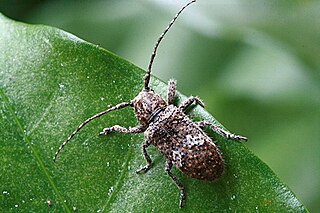
Rhytiphora bankii is a species of beetle in the family Cerambycidae. It was first described by Johan Christian Fabricius in 1775, under the genus Lamia. It is known from Australia, the Philippines, Borneo, Java, Micronesia, New Guinea, Hawaii, Moluccas, Sumatra, Vietnam, and has been introduced into Japan. The Australian species of Prosoplus were synonymised with Rhytiphora in 2013.

Chrysolina virgata is a species of leaf beetle in the genus Chrysolina.

Chrysolina coerulans, also known as the blue mint beetle or blue mint leaf beetle, is a species of beetle in the family Chrysomelidae. It is a member of the subgenus Synerga of the genus Chrysolina. It is native to a wide range of countries between mid and eastern Europe and lives alongside rivers and in meadows, it feeds on various plant members of the mint family.
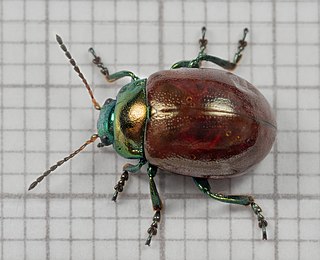
Chrysolina polita is a species of leaf beetle native to Europe.

Chrysolina sanguinolenta is a species of leaf beetle native to Europe.
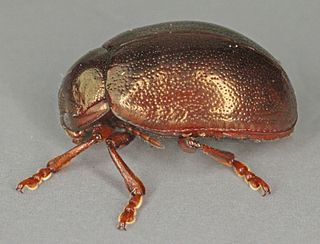
Chrysolina staphylaea is a species of leaf beetle native to Europe. It has also been found in Eastern Canada, with the first discovery being in Halifax, Nova Scotia in June 1897. The beetle has a reddish-brown body.

Chrysolina varians is a species of leaf beetle native to Europe. It is the only member of the subgenus Sphaeromela in the genus Chrysolina.
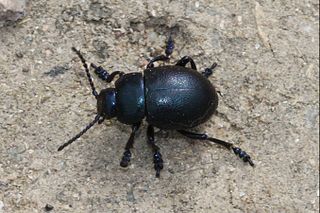
Timarcha goettingensis, commonly known as the Small Bloody-nosed Beetle or the Lesser Bloody-nosed Beetle is a species of leaf beetle native to Europe.
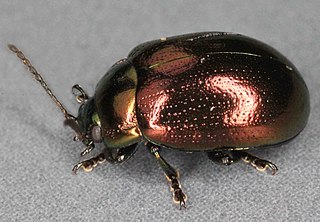
Chrysolina brunsvicensis is a species of leaf beetle in the genus Chrysolina. It is associated with plants of the genus Hypericum.

Chrysolina haemoptera, also known as the plantain leaf beetle, is a species of leaf beetle in the genus Chrysolina. They are associated with plantains (Plantago), particularly Plantago coronopus.


















